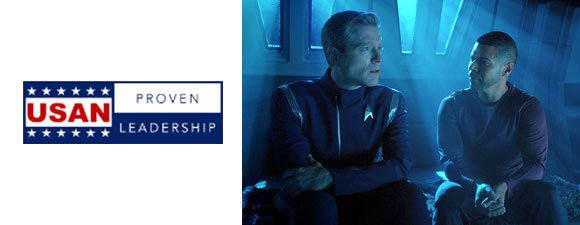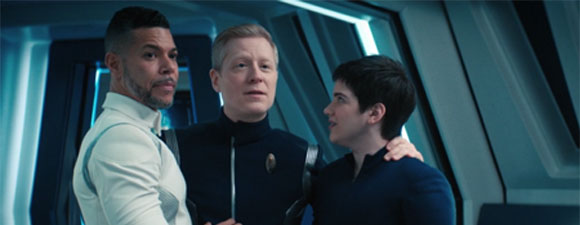Star Trek Into Darkness: More Explanations
3 min read
With the release of Star Trek into Darkness on Blu-ray, new interviews have emerged that explain or clarify choices made in the movie.
Some of the topics covered include the choice of Khan as a villain, the Alice Eve underwear scene, and the future of the Federation after the events of Star Trek into Darkness.
The choice of Khan as a villain was a controversial one, and Roberto Orci explained how it happened. “Khan was in our mind,” said Orci. “When we were doing the ’09 one, we can’t help but fantasize about a sequel, like W.O.K. — the Wrath of Kirk.”
Orci and Alex Kurtzman flirted with the idea of ending Star Trek (2009) with the discovery of the Botany Bay but decided against it.
The duo then considered a non-Khan villain and came up with a story, that this villain had been used by Starfleet and resorted to terrorism. “There is a cancer within Starfleet, and it’s a story you can pitch without saying anyone’s name prior,” said Orci. But then the duo came back to Khan again. “Once we had that story, then it became, ‘Now can it be Khan?'”
As for the Eve underwear sequence, it wasn’t Damon Lindelof who came up with the idea, but someone else, J.J. Abrams. And originally, the sequence would have been more meaningful had the story been not changed along the way. “Originally, they were going to open the torpedo in orbit, in space, so originally we had Kirk chasing her into a room where she was changing into a space suit,” said Orci. “So it seemed more purposeful when we originally conceived it.”
But production costs dictated that the torpedo be opened on land instead, and the changed seemed a bit less logical and more gratuitous. Kurtzman defended the scene, saying, “Well, it’s funny, we had tons of story conversations, and spent a whole lot of time talking about how we were going to justify that.
“And ultimately, I think it’s one of those things that you either accept is part of the scene dynamic – you know, she is bold, and certainly Carol Marcus as we knew her was bold from the first movie. That was part of what was fun about her relationship with Jim, and yet obviously it’s a different Carol Marcus than before. And we figured, how do we harness the spirit of that in this scene, and that’s ultimately where we came to it from.”
“I can’t claim to be an expert on feminism, but I can point out that you can see Kirk half-naked as well, in both movies,” said Orci. “He’s in his underwear, so is Uhura.”
When asked how the end of Star Trek into Darkness leaves the Federation, Kurtzman explained that it is definitely in a different and a worse place. “Well, I think that the title comes from the fact that Gene Roddenberry had this vision of the future where – it’s funny, my son was just asking me about this yesterday. He said, ‘Why is Star Trek Into Darkness called Star Trek Into Darkness?’ And I explained to him that Roddenberry had this beautiful and very optimistic vision of the future, where we would come to a time where different species, different alien races come together, and we would all operate together as one Federation to explore space and work together. And that vision is tested by Khan, and it is corrupted by Marcus, within itself. And so the question Kirk asks at the end of the movie, and I think the question we leave the movie on is, can Starfleet continue in its utopian vision given the kind of things that happen in the movie? And I think we know that they can happen now, so we know that they may happen again, and if these events provoke a war in the future, how will we deal with that response? This is the very definition of blowback. And so I think, hopefully we’ve set up a complicated moral dilemma, but you should definitely know that the compass of Roddenberry’s vision of an optimistic Federation, is where all of this came from.”
A fuller interview will be available on September 16 on a Mission Log podcast.







After Prometheus, and his departure from that sequel, and his unavailability for the next Star Trek movie, I wonder upon viewing the picture, above, which omits Damon Lindelof from the team, if it is a sign of the times for Mr. Lindelof.
One can only hope.
Why is it called Star Trek into Darkness? Well, it’s simple. Because of the popularity of The Dark Night. They wanted to attract more audience by simply inserting the word “dark” somewhere in the title. But it’s a crappy title anyway, probably the worst “Star Trek” movie title ever.
But dealing with corruption in Star Fleet is nothing new; tackled both in “Undiscovered Country” and “Insurrection”. The only difference was that in both those movies, the better side of humanity prevailed. What we did not have in Dorkness… er… Darkness was the schmaltzy Kirk or Picard monolog at the coda to say “we stumbled but survived”. Orci and Kurtzman make it sound like they are turning the franchise on it’s ear.
Since they had Khan and killed and resurrected Kirk in this last episode, I gather something with whales and a Klingon Bird of Prey sitting around a campfire on the top of a Borgified mountain can only be next…
And then I put in “Star Trek: The Motion Picture (Directors remastered cut)” and just sigh.
“Once we had that story, then it became, ‘Now can it
be Khan?’”
*sigh*…
The saddest thing about this movie is that they started with a perfectly good (post-Roddenberry) Star Trek story. The moral dilemma of assassinating a terrorist in Klingon space sounds like something straight out of DS9. An Admiral going overboard in the name of defense has happened so much since TNG, that it’s practically a Star Trek trope. But they buried it all in reused and re-purposed TWOK characters and events. If Harrison had remained Harrison, fans would have a whole lot less to complain about.
Absolutely true. As I said in another article, yeah, of course they COULD make him Khan… but why? Your point is spot on, it would’ve been far superior and wouldn’t have been a fundamental betrayal… because it was… either they betrayed us by lying and saying they needed to go back to Kirk’s era to tell new stories, or they betrayed us by bastardizing Trek characters for no real purpose. And if you design your movie to have a villain whose entire motivation and actions have already been defined, and then ask, can we simply ascribe those to one of the most iconic fictional villains of the 20th century, and THE most iconic villain of Star Trek, yes, again, you can…. but, again, as the President of the UFP says at Khitomer, “Let us redefine progress to mean that just because we can do a thing, it does not necessarily follow that we must do that thing.” So, yeah, the could’ve made him Khan… but they also had the option not… and restraint here would’ve gone a long way.
“And I explained to him that Roddenberry had this beautiful and very optimistic vision of the future, where we would come to a time where different species, different alien races come together, and we would all operate together as one Federation to explore space and work together. And then I decided FUCK THAT SHIT – LET’S BLOW STUFF UP AND MAKE BILLIONS!!”
The new Star Trek neither wants to explore strange new worlds, nor does it seek out new life and new civilizations…and most obviously it only goes where previous trek stories have gone before. ST has stopped exploring and it’s about chasing villains…not star trek, but Gijoe trek. Non sensical and simplistic story, continuity inconsistences, gimmicks,puns, cringe worthy dialogue, cartoonish caricature of the original characters they are suppossed portraying…bugh
Here are the posters:
http://imgur.com/eObdBsR
http://imgur.com/7mxhknk
Brilliant! Well done! Though the second one has no tag line… hmm… across the top it could say…
“A FRANCHISE GOES DOWN IN FLAMES.”
Can people stop expecting a deep, questioning Star Trek movie. Only The Motion Picture was like that. Stories like that dont translate well to cinema. People dont want to see that. Almost all of the other Star Trek films have been action adventures. No one complained then. So why start now? Give me strength.
Strap yourselves in…
So, The Wrath of Khan wasn’t deep and questioning? I think you’re confused between exploration of the unknown and something being deep and questioning, because, between the two, Wrath of Khan is far more deep and questioning in general than The Motion Picture. Here’s a brief listing of the emotional and intellectual considerations on offer in TWOK:
-The very opening sequence is the Kobayashi Maru… the introduction of the unwinnable scenario. The very existence of this test does more to address mortality and duty in that single scene than any complete outing of Star Trek in its entirety had prior. The question of whether to keep the ship safe, or to sacrifice yourselves for the greater good is what the whole damned movie is about.
-Spock then presents Kirk with his birthday gift… an even bigger acknowledgement than in The Motion Picture regarding the passage of time. After all, in that movie, the big emotional weight Kirk was carrying around was his getting older and having lost his ship… Well, he did it again and was put back behind a desk again. Whereas TMP resolved this by having Kirk be a douche to Decker, it doesn’t actually solve anything, they just have Decker merge with V’Ger and go about their merry way… no need for those messy feelings to even be addressed… it was another example of things just working out for Kirk at that point… In TWOK, there’s no such easy out. The easy out of him getting his command back is Spock dying… not easy at all. But that gift of A Tale of Two Cities is more deep and questioning than the entirety of JJ Abrams’ time with Trek, which included the destruction of a core world, which included a main character’s mother… not that you’d know it. He cared more that Kirk had died at the hands of Marcus, which he then blamed on Khan so he could do the scream, for no apparent reason….
-And that brings us to Khan… You know, the greatest villain in the history of Star Trek… Well, in the new movie, his motivations are not his own, they were designed for an abstract character and then overlayed on Khan Noonien Singh. In TWOK, the motivations of Khan were far more powerful. He had been stranded on a world and left to die when a cataclysm hit. His wife was killed. His men and women and children were killed. When Khan says, “Admiral? Admiral Kirk…” right there you have a more deep connection between antagonist and protagonist than you possibly could with Nero or new Khan or certainly V’Ger. The point being, the history between Khan and Kirk made that movie work… Khan and Kirk never even meet face to face in TWOK. For Khan to face off hand to hand, which apparently they had to do, they invented some stupid reason for characters to beam down to fight Khan in person… twice. They didn’t need to invent some stupid reason to fight Khan in TWOK… they didn’t even feel the need to fight Khan… Khan was doing enough… and what he was doing was being a masterful villain with a reasonable origin and motivation. We can’t even understand V’Ger’s motivation, and we don’t even know its extra-terrestrial origin… So, certainly TWOK is more deep and questioning itself than TMP.
-TWOK also explores Kirk, Carol, and David’s relationship… It explores the existential question of life from lifelessness, and whether we should even be trying to dabble in those dark arts… a theme carried over into the proto-matter aspect of the next movie.
-It further explores the no-win scenario with Spock’s stated solution… “How did I do, Admiral?” Do the needs of the many outweigh the needs of the few, or the one? Spock thinks so… Kirk and crew clearly don’t here and this is another extended arc… a very deep one that extends through 2 more movies… Not until he tells his father to relay to his mother that “I am fine” does this arc actually conclude in the 4th movie.
Did the deep and questioning Star Trek end there? Hardly… But, on the off chance you were joking, and I really hope you were, I’m going to pause there. Make no mistake, if you weren’t joking, I will finish this list, but if you were, I’d prefer not to waste my time.
Strength, indeed…..
Nicely done!